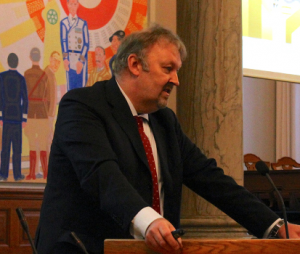European countries are still among the global leaders in advanced biobased economy. Therefore, they have an enormous potential in creating growth, innovation and jobs in this new sector. But if we wait much longer for a clear EU policy, for instance on advanced biofuels, we risk losing this position. Countries outside EU are now investing in the advanced biobased industry and if we hesitate much longer EU countries will become customers not producers in a future biobased society.
This was one of the central messages at the conference Growth, innovation and jobs within advanced bioeconomy on the 25th of November 2013. The conference was held at the Danish Parliament and organized by BioRefining Alliance.
Although, the EU biofuels policy is not yet settled the EU Commission still believes in the potential of the biobased economy. One of the conference speakers was Dirk Carrez, who is the Executive Director of the recently founded Biobased industries Consortium (BIC). BIC represents more than 100 small and large companies, clusters and organisations and is a part of the Bio-based Industries Initiative (BBI) – a Public-Private Partnership (PPP) between the European Commission and BIC. Below is our interview with Dirk Carrez.
What is the purpose of the Public Private Partnership between BIC and the EU Commission?

The PPP will finance research and innovation in the area of the biobased economy. Its objective is to create a competitive, innovative and sustainable Europe leading the transition towards a post-petroleum society while decoupling economic growth from resource depletion and environmental impact.
The vision is that the biobased industries will optimize land use and food security through a sustainable, resource-efficient and largely waste-free utilisation of Europe’s renewable raw materials for industrial processing into a wide range of biobased products, such as advanced transportation fuels, chemicals, materials, food ingredients, feed and energy.
In doing so, biobased industries will play an important role in spurring sustainable growth and boosting Europe’s competitiveness by re-industrialising and revitalising rural areas, thus providing tens of thousands of high-skilled research, development and production jobs over the next decade.
What will BIC focus on or improve more specifically?
We want to leverage Europe’s biobased research and technology, develop the under-utilised potential of agriculture and forestry residues; replace oil based chemicals and materials with biodegradable and biobased ones; generate new industries, revitalise others, and create thousands of jobs while diversifying and growing farmers’ incomes.
Can you mention some flagship projects in BIC?
Building new value chains based on the development of sustainable biomass collection and supply systems with increased productivity and improved utilisation of biomass feedstock (incl. co- and by-products), while unlocking the utilisation and valorisation of waste and lignocellulosic biomass. Bringing existing value chains to new levels, through optimised uses of feedstock and industrial side-streams while offering innovative added value products to the market, thus creating a market pull and reinforcing the competitiveness of EU agriculture and forest based industries. Last but not least, bringing technology to maturity through research and innovation, by upgrading and building demonstration and flagship biorefineries that will process the biomass into a range of innovative biobased products.
What are the main challenges in developing a European biobased industry?
Access to sustainable feedstock at a competitive price, enough funding for deployment (e.g. demonstration and “first-of-its-kind” production plants) and a growing market demand are key elements to develop the European biobased economy. However, the biobased economy is no silver bullet solution, but rather a work-in-progress with the potential of playing its fair share in addressing major socio-economic and environmental challenges. That said, we need to responsibly manage the risks associated with their increasing deployment through clear and ambitious European policies, including developing and implementing robust biomass sustainability criteria addressing land use change, securing feedstock, as well as continuing to develop and apply clear and unambiguous European and international standards that assess the sustainability of all biobased products.
This post was written by Julie Søgaard, Head of Innovation & Communication, BioRefining Alliance.


